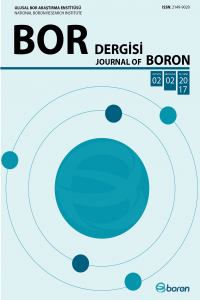Abstract
Considering
the demands for the high strength and corrosion resistant powder metallurgy
parts, the most direct yet cost effective method of production of borides can
be possibly be routed through the in-situ solid-state reaction in powder
metallurgy. Going by the known reaction paths, a composition of boron carbide
and silicon carbide in combination with aluminum was investigated at three
different sintering temperatures in order to see the effect of boron carbide on
mechanical properties of aluminum under conventional high temperature sintering
conditions. The limited study on high
temperature sintering using SiC and B4C showed gradual improvements in strength
sintering above 750 ⁰C, which can be
attributed to the in-situ formation of Si as well as SiBn, where n =
2, 4, 6 ….
References
- [1] Chattopadhyay A. K., Selective migration of metals and metal borides to strengthen boron carbide, Met. Powder Rep., 71(2), 106, 2016.
- [2] Chattopadhyay A. K., Yilmaz O., Bilen M., Baris M., Strengthening boron carbide and prevention of high pressure amorphization by inducing metals or metal borides across the grain boundary during hot pressing or sintering, Adv. Powder. Metall. Part. Mater., 7, 1–12, 2015.
- [3] Viala J.C., Bouix J., Gonzalez G, Esnouf C, Chemical reactivity of aluminium with boron carbide, J. Mater Sci., 32, 4559-4573, 1997.
- [4] Oh S.Y., Cornie J.A., Russel K.C., Wetting of ceramic particulates with liquid aluminum alloys: Part II. Study of wettability, Metall. Trans. A, 20, 533-541, 1989.
- [5] Nobel B., Trousdale A.J., Haris S.J., J. Mater Sci., 32, 5969, 1997.
- [6] Gokmese H., Bostan, B., Baris, M., Fabrication and characterization of nanoceramic particle al2o3/b4c composite by mechanochemical approach, Inorganic and Nano-Metal Chemistry, 47 (3), 416-422, 2017.
- [7] German R. M., Powder metallurgy and particulate materials processing, MPIF, 377-78, 2005.
- [8] MPIF Standard: Method for determination of transverse rupture strength of powder metallurgy materials, MPIF Standard Test Methods, 2006.
Abstract
References
- [1] Chattopadhyay A. K., Selective migration of metals and metal borides to strengthen boron carbide, Met. Powder Rep., 71(2), 106, 2016.
- [2] Chattopadhyay A. K., Yilmaz O., Bilen M., Baris M., Strengthening boron carbide and prevention of high pressure amorphization by inducing metals or metal borides across the grain boundary during hot pressing or sintering, Adv. Powder. Metall. Part. Mater., 7, 1–12, 2015.
- [3] Viala J.C., Bouix J., Gonzalez G, Esnouf C, Chemical reactivity of aluminium with boron carbide, J. Mater Sci., 32, 4559-4573, 1997.
- [4] Oh S.Y., Cornie J.A., Russel K.C., Wetting of ceramic particulates with liquid aluminum alloys: Part II. Study of wettability, Metall. Trans. A, 20, 533-541, 1989.
- [5] Nobel B., Trousdale A.J., Haris S.J., J. Mater Sci., 32, 5969, 1997.
- [6] Gokmese H., Bostan, B., Baris, M., Fabrication and characterization of nanoceramic particle al2o3/b4c composite by mechanochemical approach, Inorganic and Nano-Metal Chemistry, 47 (3), 416-422, 2017.
- [7] German R. M., Powder metallurgy and particulate materials processing, MPIF, 377-78, 2005.
- [8] MPIF Standard: Method for determination of transverse rupture strength of powder metallurgy materials, MPIF Standard Test Methods, 2006.
Details
| Subjects | Engineering |
|---|---|
| Journal Section | Research Article |
| Authors | |
| Publication Date | September 25, 2017 |
| Acceptance Date | September 6, 2017 |
| Published in Issue | Year 2017 Volume: 2 Issue: 2 |
© 2016 All Rights Reserved
TENMAK Boron Research Institute


